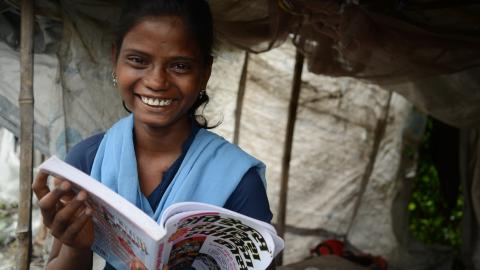
World Book Day
April 23 is UNESCO’s World Book Day to promote reading, publishing and the protection of copyright laws. World Vision works in communities and schools around the world to ensure that children have access to books and learn how to read.
“The best children's authors have a special talent for interpreting important life themes in a way which their audience can enjoy and draw appropriate lessons. One of my favourite books to read to children was Judith Vorst's Alexander and the Terrible, Horrible, No Good, Very Bad Day. The final lesson, that everybody has bad days - even people in Australia - is a great message for life!” Kevin Jenkins, President and CEO, WVI
Developing literacy skills in the early years is crucial to a child’s success in school and later in life. World Vision works with communities and families to ensure that children – including the most vulnerable – access quality education and achieve functional levels of literacy, numeracy and essential life skills. When children can read they can better advocate for their rights and help provide for their families.
World Vision helps children learn to read and access books by creating books in local languages, hosting weekend reading camps, supporting libraries and book banks, pairing children with reading buddies, and by working with parents to encourage reading in their homes. These fun activities support learning and foster a culture of reading.
Why reading matters: The facts
- If all students in low income countries left school with basic reading skills, 171 million people could be lifted out of poverty, which would be equivalent to a 12% cut in world poverty. [1]
- Globally, one year of school increases earnings by 10% on average.[2]
- If all women completed primary education, there would be 66% fewer maternal deaths.[3]
Once equipped with the power of reading, children will have greater opportunities, become life-long learners, and realise their full potential.
Click here for details on a prize competition to promote love of reading.
RELATED PUBLICATIONS:
- Basic Education - Improving learning outcomes in the early grades
- Education and Life Skills - Children are educated for life
- Literacy Boost - Creating strong literacy foundations for early grade learners
- Shellbooks - Creating locally relevant reading materials for children
____________________________________
[1] UNESCO Global Monitoring Report 2013/14, pg. 18
[2] Ibid
[3] Ibid pg. 15